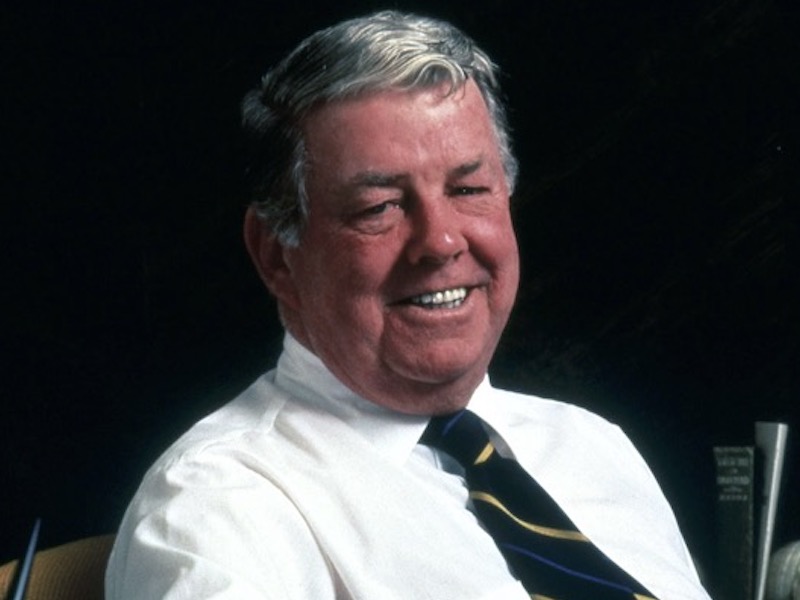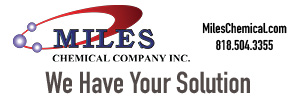Believe it or not, this article is a based off a typewritten interview with Clemco’s founder, Al Cleary. Clemco employees discovered it in an old file cabinet during a company spring cleaning in 2018.
The story is a compilation of Al’s recollections about the beginnings of Clemco, which originally was named Clementina and started out as a company that rented equipment to contractors. But Al explains that, and many other bits of industry and Clemco history, in his own words.
Two businessmen walk into a bar
The name of the company is Clemco Industries Corp. and came from the original company that was organized in San Francisco, which was Clementina Company. It started in mid-1941, shortly before World War II.
Ed [Larkin] went out to lunch with Al Miller one day to a little bar and restaurant up on Army Street in San Francisco called Pete’s Place. They had a few cocktails as they were used to doing before they had lunch, and Ed had a few more cocktails than he would normally have, apparently.
During the course of their conversation, Al decided he was going to sell Ed an air compressor. So he talked to Ed and told him that he should buy an air compressor and rent it out to somebody.
“I’ll even have it rented out for you, and I’ll have it rented on the waterfront. I want you to buy a 105-cuft portable air compressor … and it will only cost you $900!” Al said.
Ed had another martini and decided, “By God, I’m gonna buy that air compressor.”
But Al Cleary Wasn’t at That Lunch Meeting
Al Cleary served as a U.S. Navy officer during WWII. After the war, he began working at Clementina with Ed Larkin. Al’s responsibilities grew, and his increasing leadership role became instrumental in Clementina’s growth and the driving force behind the company’s development into Clemco Industries.
After WWII, Ed Larkin Hires Al Cleary
I came to work for Ed in late 1946 or early 1947. There were only three employees. We had a fleet of dump trucks at the time; we were buying dump trucks. I had many titles. I was truck dispatcher, office manager. We did have one girl in the office, so I did have someone to manage, and I was the accountant. Although I didn’t know a whole heck of a lot about accounting, I knew more than anybody else did, since there were only three of us. The formal organization began just about then, mid-1947.
We Decided to Manufacture Our Own Sandblast* Machines
We did get a number of calls, and these were mostly from along the waterfront, for sandblast machines, which were manufactured by a company called Sand Storm Manufacturing in Fresno, California. They were portable pressure vessels and portable tanks. We rented those to contractors. Most of those contractors were ship cleaners along the waterfront.
After we had our rental fleet for a while, there was a lot of maintenance, and we didn’t like that part of it. So, we decided to manufacture some of these [sandblast machines] ourselves and sell them nationally.
Al Cleary: “There Is Only One Word in the Rental Business—And That Is Service.”
Our whole philosophy was based on service. The rental business is a very simple business and there is only one word in the rental business—and that is service. If you don’t give the customer service, you’re not going to be in business.
What’s in a Name?
Ed had a friend in the trucking business, called Pete Brosetti, who also had a fleet of dump trucks. Pete had a little yard down on Clementina Street, downtown San Francisco. So, Ed called Pete and asked if he could store some equipment there until he could get somebody to rent it. Pete said, “Sure, store it here.”
Ed felt at that time that he had to have a name for his company. So with a lot of imagination and since Pete Brosetti was on Clementina Street and he was storing the equipment there, Ed decided to call the company Clementina.
One of the Finest 49ers
I remember a fellow in Tulsa, Oklahoma, Shorty Edwards. I met him in Chicago at some meeting, and he said where in the heck did a construction company ever get a name like Clementina. He said it sounded like we were selling soap or women’s stockings, but it’s not a construction-equipment company name.
I explained to Shorty … there are a number of alleys between these main streets [in San Francisco]. And the alleys, some of the names are Annie Street, Harriet Street, Jessie Street, Clementina Street, and many people asked where those names came from.
Well, where they came from, and I’m talking now the days of the 49ers, not the football team, but the Gold Rush in California, and so they named these streets after four or five leading prostitutes. So, we obviously were named and still are named after one of the finest prostitutes during the Gold Rush in San Francisco, California.
Al Cleary: “You Are People”
All the way along the line, we’ve dealt with everyone in our organization and other organizations with respect and treated them like people. I want you people who are new to Clemco Industries to remember that you are people. You’re not a number, not just a name, you’re a person as far as I’m concerned.
*Today the abrasive blasting industry recognizes that sand should NEVER be used in abrasive blasting operations because of the respiratory hazards associated with the use of abrasive containing free silica. Breathing abrasive containing crystalline (free) silica can lead to serious or fatal lung disease.
Clemco Industries is the world's largest manufacturer of air-powered abrasive blasting equipment used to clean, deburr, shot peen, remove coatings from, finish or otherwise improve a surface being blasted. It manufactures contractor and industrial machines, as well as safety and blasting accessories, needed for just about any blasting operation, ranging from equipment for self-employed contractors to multimillion-dollar facilities for the U.S. military and its allies around the globe. If you need a machine or equipment for a specific application, we have it—or can custom-engineer it for you.































